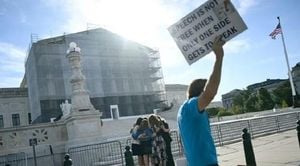Retired Supreme Court Justice Anthony Kennedy, now 89, is stepping back into the national spotlight with the publication of his memoir, Life, Law & Liberty. In a series of candid interviews this week with The Associated Press and CNN, Kennedy voiced deep concern about the creeping partisanship within the Supreme Court and the increasingly coarse tone of political discourse across the United States. As the nation approaches its 250th anniversary in 2026, Kennedy’s reflections offer a rare and sobering look at the state of American democracy from one of its most pivotal arbiters.
Speaking from his court office, Kennedy did not mince words about the challenges facing the judiciary. “The justices have to resist thinking of themselves as being partisan,” he told The Associated Press. “In our current discourse, it seems to me, partisanship is creeping its way into the court.” Kennedy, who was appointed by President Ronald Reagan and served three decades on the Supreme Court, said he is more troubled by the tone of recent court opinions than by their outcomes. “Of course, when you disagree, you criticize the other, but you criticize the opinion and the reasoning. You don’t criticize the author,” he explained. “And that point seems to be eclipsed. Some of the recent opinions are attacks on your colleagues, on the judges. I was astounded, very worried about it.”
Kennedy’s apprehension extends beyond the marble halls of the Supreme Court. He lamented the vulgarity and hostility now commonplace in public life, singling out members of Congress and even former President Donald Trump for their language. “Concerned. Worried. Disappointed with,” Kennedy said of the political climate, adding, “The rest of the world looks to us to see how free speech works, how democracy works, and in many respects they will not be impressed by what they see.” He believes that high officials should “elevate the content and elegance of our discourse.”
The retired justice’s sense of foreboding is palpable as America’s semiquincentennial approaches. “What about the next 250? I’m not so sure. I’m not so sure,” Kennedy admitted, reflecting on the country’s uncertain trajectory. His memoir, published by Simon & Schuster, traces his journey from Sacramento, California, through 43 years as a federal judge, including 30 years on the Supreme Court. The book arrives at a poignant time for Kennedy, who is still grieving the sudden loss of his son Gregory earlier this year.
Kennedy’s legacy on the Court is complex and influential. He was often the decisive swing vote in landmark cases, leaning left on issues like abortion and gay rights, and right on guns and campaign finance. Since his retirement in 2018, the Court has shifted further to the right, especially after the death of Justice Ruth Bader Ginsburg in 2023. Several of Kennedy’s key opinions have since been overturned, including the 1992 decision that preserved abortion rights—a ruling he co-authored and still believes was correct. “That was a close and difficult case. In my view, our earlier decision was correct,” Kennedy said.
One of Kennedy’s most consequential decisions was the 2015 opinion in Obergefell v. Hodges, which declared a constitutional right to same-sex marriage. Speaking to CNN, Kennedy revealed that his reasoning was profoundly shaped by the plight of children adopted by gay and lesbian parents. “A large part of the reasoning in the opinion, and the background of the opinion, was that I had not known how many children were adopted by parents who were gay or lesbian,” he said. “At first, I thought there were 75,000 children or so. It’s in the hundreds of thousands.”
Kennedy’s opinion in Obergefell was rooted in the Fourteenth Amendment’s guarantees of liberty and equal protection. He wrote, “Without the recognition, stability, and predictability marriage offers, their children suffer the stigma of knowing their families are somehow lesser. They also suffer the significant material costs of being raised by unmarried parents, relegated through no fault of their own to a more difficult and uncertain family life.” Despite dissent from Chief Justice John Roberts and Justices Clarence Thomas and Samuel Alito, Kennedy’s majority opinion has become a bedrock for same-sex couples and their families.
Yet, the future of Obergefell is not without uncertainty. In a 2022 case from Mississippi, Justice Thomas suggested reconsidering Kennedy’s opinion on same-sex marriage. A pending appeal from Kim Davis, a former Kentucky county clerk, could provide the Court with an opportunity to revisit the decision. Still, Kennedy expressed hope that the ruling would endure, emphasizing the principle of stare decisis—adherence to precedent—due to the substantial reliance by families. “Stare decisis, in large part, is based on reliance, and there has been substantial reliance by adopting parents,” Kennedy told CNN. Overturning the decision, he warned, “would cause great hurt” to same-sex couples and their children. “That would be a tremendous reliance problem.”
Kennedy’s tenure was not without personal and professional conflict. His Catholic faith, he wrote, made abortion cases especially challenging. He considered resigning over abortion in 1992 before casting the decisive vote to uphold Roe v. Wade in Planned Parenthood v. Casey. Four years after his retirement, the Supreme Court overturned Roe in Dobbs v. Jackson Women’s Health Organization, with Justice Brett Kavanaugh—his successor—providing a crucial vote. Asked whether he would have voted to reverse Roe, Kennedy demurred: “I won’t comment. I stand by what I’ve written.”
The leak of the draft opinion in Dobbs in May 2022 deeply unsettled Kennedy. “It was most upsetting,” he said to CNN. “Because fingers started being pointed in every direction, you know, Who’s the leaker? Was it a justice? A clerk? Or somebody in the clerk’s office? I thought they should have done a little more to investigate who it was. It was very serious.” The Court’s internal investigation failed to identify the culprit, despite more than 90 people having access to the draft.
Throughout his career, Kennedy has prized civility and mutual respect among the justices. He recounted a personal episode with the late Justice Antonin Scalia, whose biting dissent in the same-sex marriage case led to a temporary rift before the two reconciled shortly before Scalia’s death in 2016. Kennedy worries that such personal attacks are becoming more frequent and more damaging. “It’s very important to me that the opinions be written in a more moderate tone than they are,” he told CNN. “Ultimately, the law depends on the respect given to the court’s opinions. That respect is undermined if there is a quarrelsome rhetoric.”
Despite his misgivings, Kennedy refrained from criticizing individual justices or political figures, including President Trump. “I don’t think in our position we should engage in political dialogue. It wouldn’t be right for me as a judge,” he said. Nevertheless, he acknowledged the White House consulted him on judicial nominees after his retirement, but insisted there was no arrangement or inducement regarding his departure. He also confirmed a remark to Trump after a March 2025 address to Congress, thanking him for teaching young people to love America, adding, “I said that. Sure. I said, that should be your principal mission.”
As Kennedy’s memoir hits the shelves, his reflections serve as both a warning and a call to action for the country’s leaders and citizens alike. The challenges facing the Supreme Court—and the nation—are many, but Kennedy’s hope for a more civil, principled discourse remains undimmed.




